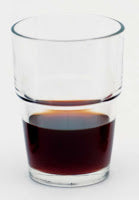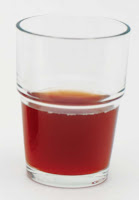October 23, 2018
Rye Wine (a Parti-Gyle Experiment)
I stumbled across the idea of making a rye wine in early 2010. I imagined the next winter would be much better with a silky, dark, garnet beer full of booze and character in my mittened hand.

Originally I thought of making a beer from 100% rye, but retracted the rye to roughly 33% in the recipe—rye creates a gooey, sticky mash and getting the wort out of the mash tun can be a problem if you use too much.
I built the recipe using my high gravity Scottish ale experience and the Northern Brewer Roggenbier recipe as a base. Using German malts and hops, I set out to brew a strong, decadent, German Barley/Rye wine. In addition, my goal was to do a parti-gyle mash and get two ten-gallon batches of beer from one mash tun full of grain. The second batch would be weaker and use less hops, but still be a worthy beer in its own right.
The brew day itself had many speed bumps. A broken yeast starter, a broken hydrometer, splashed some boiling water on my shoe, the water absorbed by the mash did not match up with my calculations, but in the end, four great beers were created, each with their own unique character.
To those out there who have never taken the step of making and developing your own recipe, please do not hesitate to try. The reward of a beer that is truly your creation brings a pride that you must share and talk about with everyone who will listen, which can be a difficult task for a modest Minnesotan.
Recipe
Target amount: 10 gallons of Righteousness and 10 gallons of Commander Riker
Grist
- 15 lbs. Rye Malt (Weyerman)
- 10 lbs. German Munich (Weyerman)
- 10 lbs. German Vienna (Weyerman)
- 10 lbs. German Pilsner (Weyerman)
- 2 lbs. Flaked Rye
- 1 lbs. Special B (Dingemans)
- 1 lbs. Chocolate Rye (Weyerman)
- 1 lbs. Rice Hulls
Mash Schedule
- 150° F (75 min)
- 168° F (10 min)
Hops
Righteousness (Big Beer)
- 2 oz. Centennial (60 min)
- 1.5 oz. Tradition (30 min)
- .5 oz. Tradition (15 min)
Commander Riker
(Little Beer)
- 1 oz. Centennial (60 min)
- .5 oz. Tradition (30 min)
- .5 oz. Tradition (15 min)
Brewing Notes:
- This is a horrendous amount of mash and water to deal with.Consider cutting this recipe in half and doing five gallon batches for home use.Since this was an experiment and Northern Brewer World Headquarters has 2x 25 gallons Megapots and a Top Tier™ system to work with was able to utilize a gianormous mash-tun.
- IMPORTANT! Calculate your parti-gyle compensating for parti-gyle. There are many resources to help with this (I've included one link below the tasting notes). Most brewing software calculates mash automatically, not allowing you to exclude the sparge. According to the software I used the OG of the beer was supposed to be 1.108, but ended up squarely at 1.090. If calculations aren't you boat, you can measure brix as you drain the mash-tun to reach a specific gravity in the boil kettle for the big beer. Afterward pert the rest of the sparge into the little beer's kettle.
- This beer was basically a very full mash-tun drained for the big beer. Then instead of sparging, I refilled the mash-tun, let it sit for 20 minutes, and then drained it as the small beer. So the sparge was the second beer.
- Don't kick over and break your yeast starter. It makes it more difficult to use. I ended up using two fresh pack of Wyeast 1728 Scottish Ale instead of scraping up and pitching my accident.
- Long boils = awesome. I planned a 75 minute mash and boil for the Righteousness. The wonderful characteristics of a long boil arguably add so much more to a strong, cellared beers than a hop bombing. Plus, long boils are cheaper than hops. Aim for the low end of a suggested IBU range for your next strong beer.
Tasting Notes:

Righteousness 1728 (Fermented with Wyeast 1728 Scottish Ale yeast)
O.G. 1090–F.G.1.009. Deep brown. Unctuous aroma of pumpernickel bread and Munich malt with dried fruit and sherry coming up from underneath, hints of perfumy alcohol. Positively oily in the mouth with explosive spice and mint from the rye, very long warming finish.

Righteousness 4347 (Fermented with Wyeast 4347 Eau de Vie yeast)
O.G. 1090–F.G.1.002. Deep brown. The nose is fruity, sweet, boozy - almost braggot-like. Still oily, but much leaner and sharper - whereas the 1728 left it soft and round, here the corners of the hops and high abv stand out. Meadlike. Hot, alcoholic finish - this will be unbelievable in 1-2 years.

Commander Riker 1728 (fermented with Wyeast 1728 Scottish Ale yeast)
O.G. 1040–F.G.1.007. Garnet-brown. Spicy-malty bouquet, smells heftier than the OG. Complex flavor with flashes of rye, biscuit, spice and mint. Creamy mouthfeel. Nice!

Commander Riker 4347 (Fermented with Wyeast 4347 Eau de Vie yeast)
O.G. 1040–F.G.1.001. Garnet brown, hazier than 1728. Tangy aroma - sourdough bread, young wine. Rye and malt overlaid with vaguely sulfury wine-like character. Very, very dry, snappy finish. The combination of tangy wine yeast flavors, extremely low FG, and rye makes this very interesting - could pass for a young Flemish red sour ale.
Parti-gyle Brewing by Randy Mosher

|
 |
 |
 |
 |
 |
 |
 |
 |
 |
 |
 |
